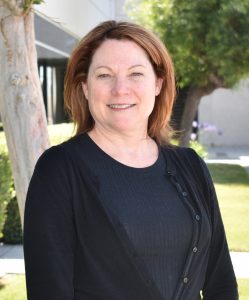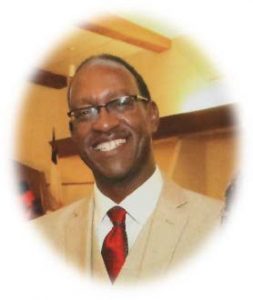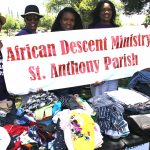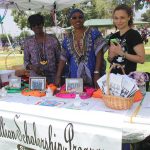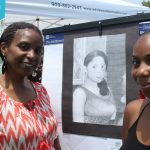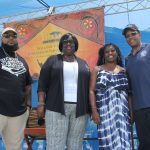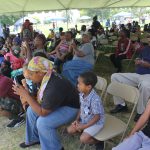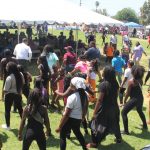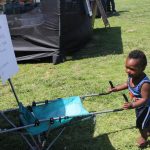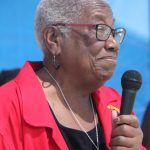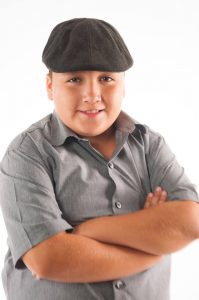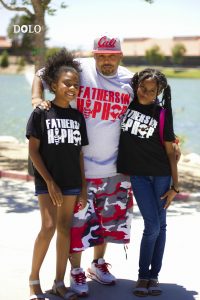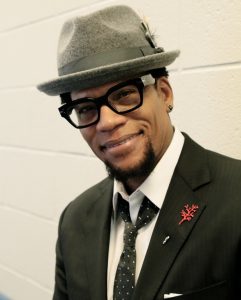
Photo credit: Shannon McCollum
By Allison Kugel
(EMPIRE NEWS NETWORK (ENN)— Hailed as one of the most prolific standup comedians of the past three decades, D.L. Hughley has never been afraid to dig into ethnic stereotypes, economic disparity, relationships, politics… nothing’s off limits. His words are explicit and paint an accurate portrait of societal contradictions and pain in fast forward.
From his legendary standup material and his nationally syndicated radio show, The D.L. Hughley Show, to his upcoming Netflix series, The Fix (a hybrid game show/issues-based panel talk show), D.L.’s platform as an outspoken advocate of civil rights is unconventional and tinged with off-color language. But as he shared with me during our conversation, he believes that to reach people with a heavy message, you’ve got to get them to let their guard down through laughter.
His latest book, How Not To Get Shot: And Other Advice From White People (Out June 26th)pulls no punches and offers no apologies, as Hughley puts forth his satirical and bitingly sarcastic take on racial profiling, police shootings, President Trump, and the advice that white people often give black people on how to adequately assimilate into American society. Nothing is off limits as he covers topics like black names versus white names, dressing black versus dressing white, how white people advise black people to talk to the police, neighborhood profiling, “the race card,” and a host of other hot button, racially charged issues. D.L. goes in.
The book doubles down on D.L.’s already controversial public platform. It is filled with humor, sorrow and irony, and it will make you a bit uncomfortable no matter what side of the fence you are on.
Allison Kugel: Did the motivation to write your latest book, How Not To Get Shot (And Other Advice From White People), come from a place of fear, love, hope, anger…?
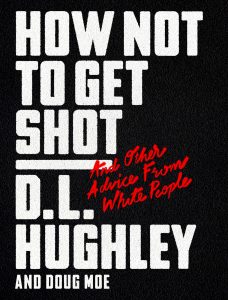
Photo credit: William Morrow, an Imprint of HarperCollins Publishers
D.L. Hughley: I think all those things. Fear, frustration, anger… they all kind of mirror each other. When I was writing this book, I realized that society would never take a good look at itself unless you make it feel good; unless you give them something to make their ears tickle a little bit. My overall thought was to be clear enough where it doesn’t seem trite, and to be satirical enough where people can’t tell if I’m being serious or not. And I needed it to be angry enough to mirror the people who go through these things all the time. Watching people of color being slaughtered at the hands of police is nothing new. I grew up in Los Angeles, so it happened quite often. Everybody always wants to say they want to start this conversation, and this book is my contribution to that conversation.
Allison Kugel: Do you feel safe living in the United States?
D.L. Hughley: I don’t think I ever… black men and safety don’t go together. There are a lot of words that black people use to describe how they feel, but I don’t think “safe” is one of them.
Allison Kugel: What do you tell your kids when they ask if they’re safe?
D.L. Hughley: That we’re going to do the best we can to make sure. I think that America’s never seen a person of color that lost their life where the powers-that-be were compelled to do something about it; where they were actually moved to action. Whether it was Emmett Till or Trayvon Martin, I think they have a certain kind of distance when it comes to black people dying. The first thing they’ll say is, “Well, if you wouldn’t have done this?” or “You shouldn’t have done that.” The impetus for me writing this book was going on Megyn Kelly’s show (Megyn Kelly TODAY). I went on Megyn Kelly’s show and we were going to talk about the police and policing, and she had Mark Fuhrman (disgraced detective in the 1995 O.J. Simpson murder trial)on the same show. She didn’t tell me he was going to be on, and he went on before me. They had Mark Fuhrman on to talk about policing. He got fired for lying. He lied so much that he got a murderer off. He got O.J. off! And this is how we start the conversation about policing, and about good police versus bad police? Even other police will tell you that Mark Fuhrman was a bad [cop]. That’s how they decided to start the conversation that day. That’s when I knew I would write this book.
Allison Kugel: You’ve discussed in great detail, your previous affiliation as a gang member with the Bloods in Los Angeles. What was the life lesson from that experience for you? What was the major takeaway?
D.L. Hughley: The takeaway was a level of independence and compassion. One of the things that I always felt bad about when I was growing up was that even when I was in that situation, I knew I wasn’t ofthat situation. I knew that I didn’t belong there. I knew I would do something else. It taught me to have compassion for people who, for them, that was their natural experience. While I knew that I wasn’t born for that, that [gang] experience was organic to a lot of people. So, it was knowing that I was in that situation and not of it, and to have compassion for the guys who didn’t see any other way to live. When I was eighteen or nineteen years old, stuff got so bad, I tried to get into the Los Angeles Police Academy. I just wanted things to be different. I was reaching at anything to not give into the frustration that was all around me.
Allison Kugel: Do you fear that this book is simply going to preach to the choir rather than reaching a wider demographic of people?
D.L. Hughley: I think that people who have already made up their mind before a question is even asked, they have a certain perspective. But a lot of the book is based on statistics and facts, things that have happened and their outcome. There are always a lot of white people who want to tell you what they would do if they were black, but they can only tell you what they would do if they were black from their current perspective(laughs). They can’t tell you what it’s like. I’m sure that a lot of people who have had positive experiences with the police can’t believe that the police that pull them over are the same policemen that interact with me. They can’t believe it because it’s not their experience. But my hope is that people can at least look at this book and see that things aren’t the same as their own experience. You don’t have to have that experience to know those things do exist.
Allison Kugel: Does fame and money insulate you at all from racial profiling and police harassment?
D.L. Hughley: It didn’t insulate Bill Cosby’s son (the late Ennis Cosby). He was still shot down by violence. It didn’t insulate Tupac when he was shot. There was a member of Earth Wind and Firewho was shot by the Santa Monica Police Department for holding a fireplace holder. I think when you’re black and nobody knows that you’re famous, it doesn’t matter anyway. Before they see anything else, they see that you’re black.
Allison Kugel: There was one page in the book where you ask the reader, “Who can say the “N” word?” and then you answer, “Fucking black people, and that’s it.” Using myself as an example, not only do I not want you to use racial or religious slurs against me as a Jewish person, I have no desire to say them about myself either. Why do you even want to have the right to use the “N” word? Why use it?
D.L. Hughley: I don’t want to have the right. I wish it didn’t exist, but it does so I won’t pretend that it doesn’t. The most annoying thing is that people will blame the use of the “N” word on black people. They’ll say, “Well, if you didn’t use it, then maybe we wouldn’t use it. You use it in hip hop all the time.” That word has been a part of the American lexicon since the early 1700s. Hip hop’s been around since 1975. What came first, the “N” word or The Sugarhill Gang? To pretend that black people can stop saying it and then all people will stop feeling that way about us, and that it will go away, is ridiculous. There has never been a word in our lexicon that equates to that word, not one.
Allison Kugel: I’m going to share my perspective at the risk of you getting mad at me…
D.L. Hughley: I won’t get mad at you…
Allison Kugel: To give my perspective as a female, I have always felt that the B word was used to dehumanize women, and I can remember that word stinging from the time I was a little kid. I remember thinking, “Does that word mean that I’m less than human?” So, from where I’m sitting, a de-humanizing word is a de-humanizing word. Am I way off base with that one?
D.L. Hughley: There is no equating the two. They took a word which means a female dog, and equated it to something else, that is true. But they made up a word to describe us. The “B” word is horrible, but it had another meaning. Our word never had another meaning. They invented a word just for us. To me, there is no comparison and no other word that equates to our word.
Allison Kugel: On page 164 of your book, you cite the statistic that 72% of black births in the United States are from unwed mothers, and you do point out that it includes women who have partners but are unmarried, and women who simply choose to not be married. Then you go on to point out that one reason black women often outnumber eligible black men is because so many black men are in prison. Do you pin some of that on former President Bill Clinton’s now infamous 1994 crime bill that ultimately led to the mass incarceration of black men in the United States?
D.L. Hughley: Here’s what I will say… I remember when they banned assault rifles (a ten-year ban passed by United States Congress in 1994). It wasn’t because mass shooters were using them. It was because gang members were using them. Bill Clinton banned them at the time because of that. Bill Clinton gave black community members, black community leaders and elected officials, what they asked for, which was relief from crime. And now they get to pretend that they didn’t ask for it. They asked for that. Black leaders asked for harsher sentences, and now they get to pretend that they didn’t. I remember that Bill Clinton had a Republican congress. Everything he did would have had to go through congress, and they weren’t inclined to do anything but be hard on n*****s. I think Bill Clinton is at fault. I think the elected officials are at fault, and I think that the American population is at fault. Any time somebody sells somebody out, it’s going to be us. That includes our own elected officials, our own civic leaders and our own religious leaders. If you want to send a black man to prison, get a conservative black person on the jury. You cannot not send black people to jail without other black people being complicit in some way.
Allison Kugel: There’s a part in the book where you compare black-sounding names versus white-sounding names, and dressing black versus dressing white, in a sarcastic way. Do you think black people are more pressured to assimilate than other ethnic groups? And by the way, your kids have very Caucasian-sounding names. Was that deliberate on your part?
D.L. Hughley: It was more so my wife. I wanted them to have names where you can tell where they’re from. But statistically, if a person has an urban-sounding name they are less likely to be hired. She knew that, and I didn’t. The Washington Post did a story on biases with teachers, where if you live in a certain zip code, if you come from a single parent home, if you have a certain name, you’re judged a certain way. My wife knew all of that. I’m glad she named our kids. When it first happened, it used to annoy me, but she didn’t weigh them down with my [issues].
Allison Kugel: What’s your opinion on the song, The Story of O.J.by Jay Z and the music video for the song. Brilliant social commentary or offensive imagery?
D.L. Hughley: Brilliant is a word that’s used a lot. I think it was demonstrative. I got it. I wouldn’t call it “brilliant,” because that word is overused. I think it was clear and interesting, and satirical. But brilliant would be a whole different level or category.
Allison Kugel: I know of some people who thought it made an interesting and accurate social statement, and other people I know were completely offended by it because of the negative stereotypical images it portrayed.
D.L. Hughley: There’s a book called Whistling Vivaldi: How Stereotypes Affect Us and What We Can Do (W.W. Norton and Company). It’s about stereotypes and how they started. Stereotypes exist because somebody embodied them. I’m not saying most people, but some people did. And it was clear enough where people took that as the majority. I was on a plane one time and it was me and a bunch of other famous comics. A lady came up to us and said, “Are you guys in entertainment?” because we were in first class. They all got offended. I was like, “Motherf*cker, we are in entertainment, and we are sitting in first class, so shut up!” (Laughs). Most black people you know who are wealthy are in entertainment or they’re athletes, so stop pretending like that’s not true. It doesn’t mean that all of us are that, but a lot of people embody that fact.
Allison Kugel: Do you believe there is a reason for everything that happens, and that you are here at this time, exactly as you are, for a greater purpose?
D.L. Hughley: I think I am supposed to give a higher level of clarity and specificity to the things I see. All an artist can ever be is what they see. I want my people, and by that, I mean all human beings, to see themselves. And I don’t want people to make excuses. This week I watched people use the bible to justify putting children in chains. Those are the same scriptures they used to put black men in chains. If there is anything I do, it’s to be an artist who is clear enough so that people will get that I’m saying exactly what I saw.
Allison Kugel: Where is the elusive bridge of communication, for example, between police officers and the black community?
D.L. Hughley: Here’s the way we have a dialogue; it starts with accountability. The same accountability you demand from us as a community, we should demand from you as [law enforcement] professionals. When a mayor in Los Angeles says we need to teach our children to respect the police, well children are just children and that’s why you have parents. You have to guide them at that age, and in the process they make a lot of mistakes. But is a reasonable solution to a communal problem to say that children need to be more responsible than trained adults? When Megyn Kelly has me on her show to talk about the police and says, “I’m going to talk with Mark Fuhrman first,” or when you tell children to act more responsible than adults who are fully trained by the state, that’s based on a false premise.
Allison Kugel: What do you think the police are afraid of?
D.L. Hughley: I can’t speak for them. I can’t tell you what they’re afraid of. But I can tell you this, that I don’t only teach my children to respect the police, I teach them to fear the police. If the police treated us like the human beings that they say they serve, then we would be okay, but they don’t. What the police do is what they’ve always done to black people, to keep us in our place. You’re suspicious if you’re somewhere you don’t belong. The reason we have all these policemen getting called is because [black people] are in places where people aren’t used to seeing them or are uncomfortable seeing them. That’s always been their mission. Maybe we should change what their mission is. Maybe it shouldn’t be to just keep us in our place. Maybe it should be to treat us like citizens. If you call the police on somebody for barbequing, for sleeping in a common area at Yale, or walking to a mall, or eating at certain places, what that tells you is the police’s goal is to make society feel safe from us. I got the police called on me in my own neighborhood, and I’ve lived there for seventeen years. My wife has had that happen and my children have had that happen. You can look around Calabasas (a tony suburb in Los Angeles’s northern San Fernando Valley)and you wouldn’t see many people who have lived there longer than me, but I’mthe stranger!
Allison Kugel: Have you had some positive interactions with the police?
D.L. Hughley: Sure. Generally, they work for me (laughs). I have three police officers that work for me. But, it’s been ninety percent [nonsense] and ten percent cool. I think white people would say it’s the other way around.
Allison Kugel: I’ve often heard black men say that if they are too outspoken about racial issues and/or if they’re platform should grow too big and too powerful, they then become a target and the government will now see them as a problem that needs to be dealt with. Do you ever think about that?
D.L. Hughley: I’m going to do what it is I believe. I can’t say how people will respond to it. That’s not my job. You gotta be doing somethingwhen you go. I teach my children to stand up for what they believe in and to be willing to sacrifice for their beliefs. And I can say that my children know who they are as people, and they know who I am and what I believe.
D.L. Hughley’s book, How Not To Get Shot (And Other Advice From White People)is available everywhere books are sold June 26, 2018. Pre-order your copy. His hit radio show, The D.L. Hughley Show, airs weekdays, 3PM to 7PM in national syndication.
Allison Kugel is a syndicated entertainment and pop culture journalist, and author of the book, Journaling Fame: A memoir of a life unhinged and on the record. Follow her on Instagram @theallisonkugel and visit AllisonKugel.com.
 Westside Story Newspaper – Online The News of The Empire – Sharing the Quest for Excellence
Westside Story Newspaper – Online The News of The Empire – Sharing the Quest for Excellence
